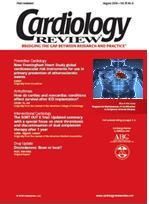The cost of failure
When considering the article by Goldberg and colleagues, it seems reasonable to request a change in the title to "Survival after the diagnosis of  heart failure."
When considering the article by Goldberg and colleagues, it seems reasonable to request a change in the title to "Survival after the diagnosis of  heart failure." Such a change would emphasize that heart failure is a chronic disease that must be vigilantly managed by both patient and physician to limit the extensive morbidity and mortality of the seemingly compensated individual.
Title aside, the article makes clear the challenging fight for survival faced by heart failure patients once hospitalized with an acute decompensation.1 Even after removing the presumably more critically ill 4% that succumbs to in-hospital death, survival after a hospital admission for heart failure is a dismal 63% at 1 year and 21% at 5 years. This bleak prognosis vies with the most malignant forms of cancer (Table).2
Although not earth-shattering to the grizzled heart failure specialist, these mortality statistics may be striking to other physicians in the wake of nearly 3 decades of cardiologists trumpeting the dramatic advancements in both the diagnosis and treatment of heart failure patients (Figures 1 and 2). So where are the advantages we have painstakingly achieved? What happened to the mortality reductions of 16% with the use of angiotensin-converting enzyme (ACE) inhibitors,3 35% reduction with beta blockers,4 30% reduction with aldosterone antagonists,5 36% reduction with biventricular pacemakers,6 and 23% reduction with implantable cardiac defibrillators?7
Table. Comparison of 1- and 5-year survival after
hospitalization for heart failure.
Figure 1 (A). Cumulative mortality rates for subjects enrolled in chronic heart
failure studies. (B) Percentages of study patients in each heart failure
classification. NYHA indicates New York Heart Association functional class.
Perhaps circumstances preceding hospitalizations can offer clues. The Acute Decompensated Heart Failure National Registry (ADHERE) has quite disturbingly shown that many heart failure patients fail to receive optimal medications prior to their decompensation and hospitalization. More than 40% are not receiving ACE inhibitors or angiotensin II receptor blockers, and more than 30% are not receiving beta blockers.8 In addition, multiple avenues exist for medication failure, even if prescribed: noncompliance, the lack of effective long-term outpatient monitoring, and the readiness with which heart failure patients are dismissed as intolerant of potentially life-saving therapies. Moreover, there exists little economic incentive for physicians to rigorously monitor their heart failure patients for the early stages of decompensation, hyperkalemia, and renal failure.
What about the long-term mortality ramifications of actions taken during the acute hospitalization? Although more than 90% of heart failure patients are hospitalized with volume overload, less than 50% lose more than 5 pounds during the acute hospitalization.8 This may reflect the difficulty in clinically assessing persistent volume overload9 or the fear of inducing renal dysfunction in a patient population where renal function predicts not only in-hospital but also long-term mortality.10-14 It is therefore surprising that no technologically pragmatic application exists to guide the aggressiveness of diuresis or to gauge when euvolemia has been established.
Figure 2. Cumulative mortality rates for subjects enrolled in acute or severe
decompensation heart failure studies. NYHA indicates New York Heart Association
functional class.
It is also sobering to know that, despite a plethora of studies guiding our outpatient treatment, currently no category IA evidence (evidence obtained from systematic review of meta-analysis of randomized, controlled trials) exists to guide the therapy of acutely decompensated heart failure patients. There are no prospective, double-blind, placebo-controlled studies that have shown the benefit of any medication used in the treatment of acutely decompensated heart failure patients to improve 1-, 3-, or 5-year mortality.15-17 The lack of answers to fundamental questions, including the initial dose and type of diuretics, the optimal method of volume removal, and the role of vasodilators or inotropes, undermines our ability to institute effective therapy. The complexity of trying to solve acute hemodynamic and volume issues while also paying attention to the long-term effects of the acute neurohumoral activation18 is daunting and may be responsible for the lack of mortality benefits with newer diuretics, despite their enhanced early diuresis.19
An additional variable is the hospital presentation of the heart failure patient. Although heart failure maybe the primary cause of the hospitalization, it may also appear as acomorbid diagnosis associated with disease states that may be relatively more or less lethal. Cancer, gastrointestinal disease, chronic obstructive pulmonary disease, and sepsis are common cotravelers. In addition, heart failure decompensation in the setting of ischemia, atrial fibrillation, renal dysfunction, and shock result in a call for differential therapies.
The high mortality rates after a hospitalization associated with heart failure require that all aspects of the heart failure admission—from presentation, to medical optimization, discharge, and follow-up—undergo prospective evaluation to better understand the factors that contribute to the significant mortality associated with progressive pump failure and sudden death.
